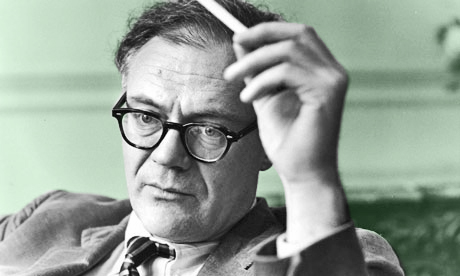
Robert Lowell and Elizabeth Bishop enjoyed a close friendship from 1947 until Lowell’s death in 1977, frequently exchanging critique and insight on each other’s work, with Lowell often citing Bishop as one of his greatest influences. Below, Lowell writes to Bishop detailing the tedium of a poetry contest he was called upon to judge, and sharing a number of colorful anecdotes about his interactions with fellow judges, among whom were Marianne Moore and Randall Jarrell.
Boston
October 24, 1956
Dearest Elizabeth:
U R 2 good 2 B 4 got 10. What a grand line! I’m just back from a week in New York and Washington. In New York I was on some poetry committee to give a poetry prize for Brandeis College in memory of Judge Brandeis. When I arrived at the 5th Avenue palace Marianne Moore was sprawled like some Boucher goddess in a print dress and black cartwheel hat on the huge marble disc of the huge marble banister. Next to her Louise Bogan looking a little stiff, proud and shocked. We went into the ballroom, a room a mile wide and long with a green carpet, nothing anywhere except a green carpet, little rickety iron chairs hugging the wall, and a green baize-covered lopsided ping pong table. We ordered into the elevator, a matchbox that would only scarcely hold me and Miss Moore. Arriving, we entered on a man dictating, who waved us away and said without raising his eyes, “Oh heavens, first floor.” But someone at the end of the corridor welcomed us. We entered a narrow room about as big as three matchboxes. There sat two secretaries and Mr. Warburg, “Piggy” as I later learned from Louis Kronenberger.
Mr. Warburg immediately began spouting in a stately drone and couldn’t be forced to wait for the other three judges. It never stopped for an hour and three quarters. I don’t think he really had any effect on our voting, nor did we have much of any effect on him. At one time he talked for fifteen minutes on the climate and sloping banks of the islands off Vancouver, a “place where all poets should go.” His voice was terrible in the little space and made one feel as though it were an airplane descending forever from a great altitude. Moore sayings: Someone proposed Padraic Colum. “Well lately he has split apart.” She meant his poetry had. Referring to you, “Poor Elizabeth, she does her best to bear up and rejoice.” To W.C. Williams, “And his is sometimes ASTONISHINGLY RIGHT, sometimes!” To Mr. Warburg, who seemed on the point of proposing a second meeting for a second ballot, “But these meetings are death to me.” Someone said that he didn’t suppose she often undertook the trip in from Brooklyn. Miss Moore: “I just got back from California.” However, she was always small, gracious, mobile and beautiful. I feel utterly in love with her. At the end of the meeting, Mr. Warburg, tanned, bald, brown-patched, Buddha-nosed, beaming, growing as big as Huntington Cairns, and having to be prodded by both his secretaries each time one us spoke—at the end Mr. Warburg said to me, “Goodbye….” long pause. “Mr….” pause. “I have always wondered if your name were pronounced Lou-well or Lowe-well.”
Well, Randall! Like the earth he carries his atmosphere with him and is no different in Washington than he is in Greensboro. In the office he has his big Degas, Munch, Klee, and Vuillard (?) reproductions and a spectacle photograph, like a picture of one’s wife and baby, in a leather frame on his desk: Chekhov. At his home in Chevy Chase he has big reproductions of Degas, Munch, etc. Photographs in the shadowy hall of Wallace Stevens and Marianne Moore and on his desk another photograph—this time without spectacles—of Chekhov. […]
[…] I loved your description of the blue-and-brown-eyed beauty—how like my mother I seized on the vulnerable detail! I’ve shot my wad. Bear up, my dear, and come back to us. Elizabeth is grand, enormous, lovely and sends you her love, and I send mine.
Cal
P.S. My poor Cousin Harriet, frail and wonderful, she had a stroke last winter and her right arm and leg will remain paralyzed forever. I had a good visit with her and she talked just as someone my own age, only wittier and more natural. I think going out that way is even better than instant death, late in life and in full health. I saw Ezra, but I’ll save that for another letter.
P.S. There’s a review of Auden’s Faber Book of Verse in the New Statesman by Walter Allen, who calls you the best woman poet since Emily Dickinson. I know you like neither E.D. nor being called a “woman poet.”
From Words in Air: The Complete Correspondence Between Elizabeth Bishop and Robert Lowell. Edited by Thomas Travisano, Saskia Hamilton. New York: Macmillan, 2010. pp. 186-188
FURTHER READING
Learn more about the legacy of Marianne Moore and her influence on the younger Modernist poets of the time.
Read Lowell’s poem, “The Scream,” originally published in The Kenyon Review in 1962, as well as the Bishop short story that inspired it, “In the Village.”
Read Lowell’s eulogy for Randall Jarrell, archived by the New York Review of Books from the November 25, 1965 issue.


